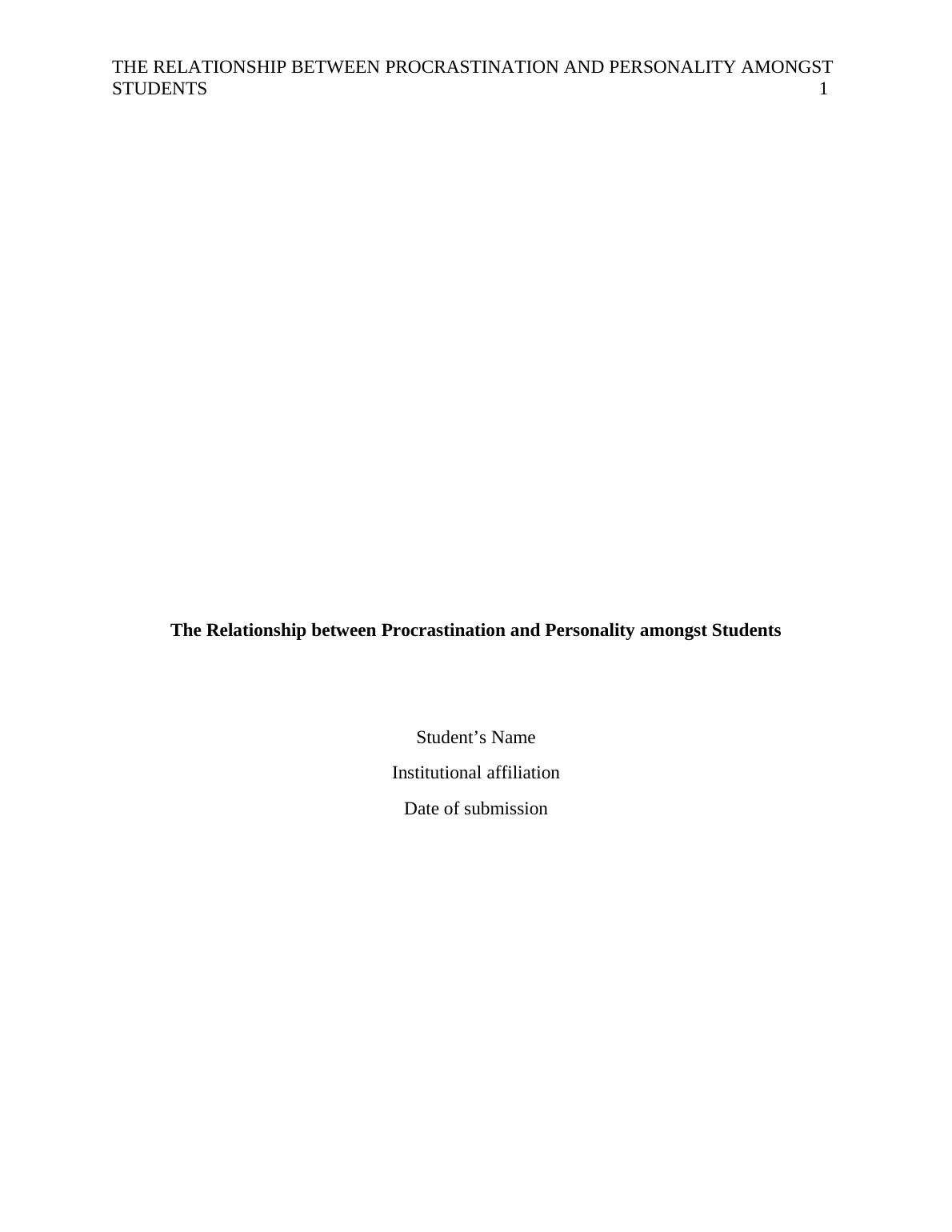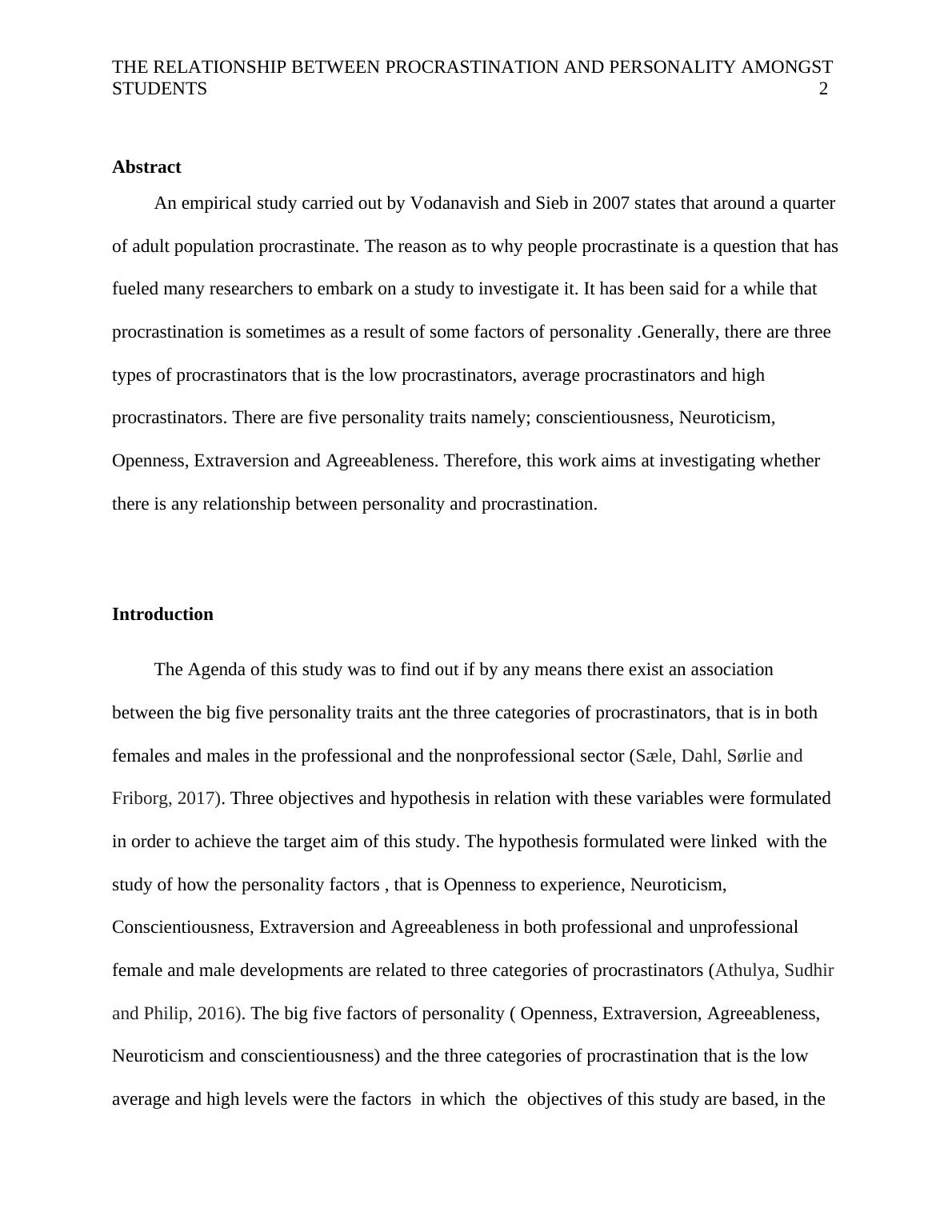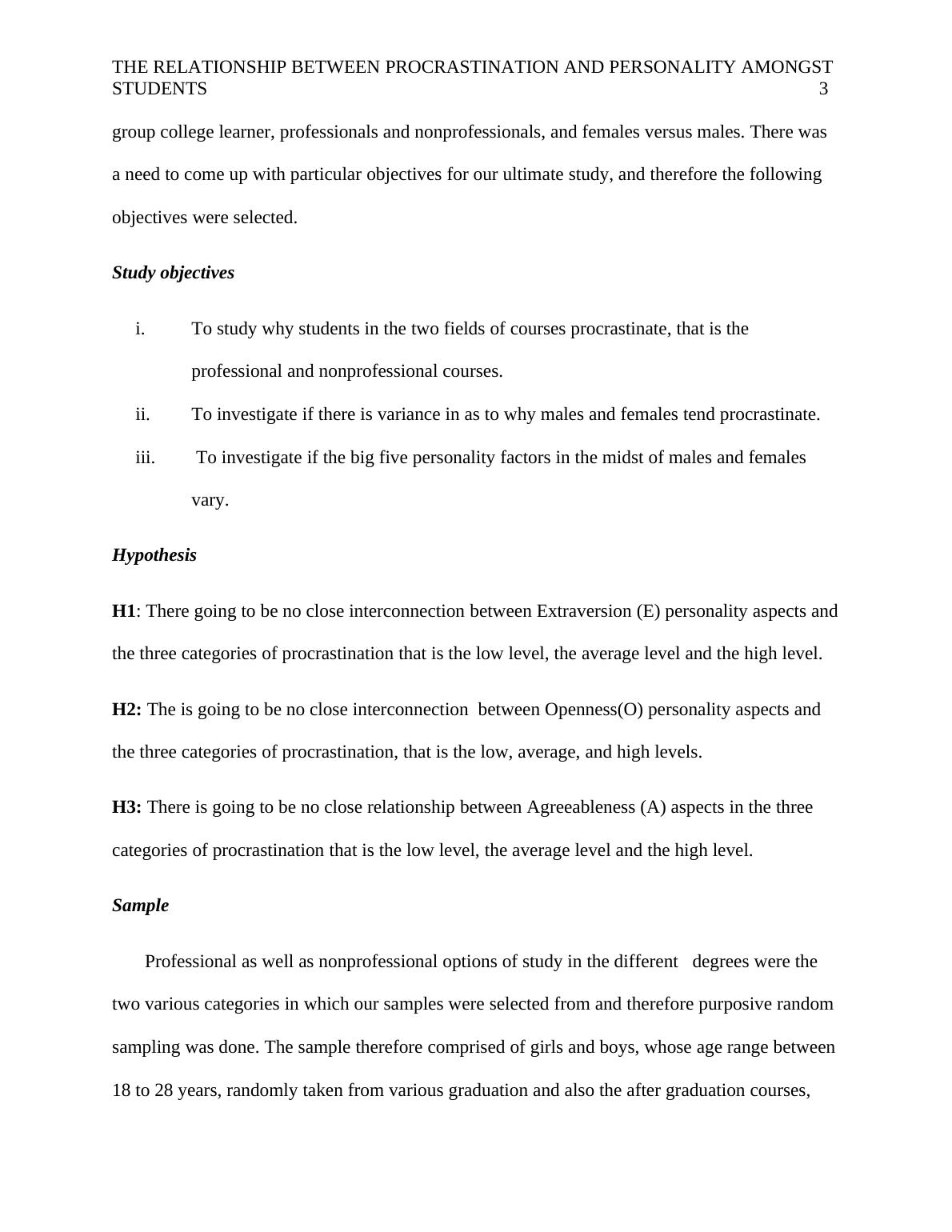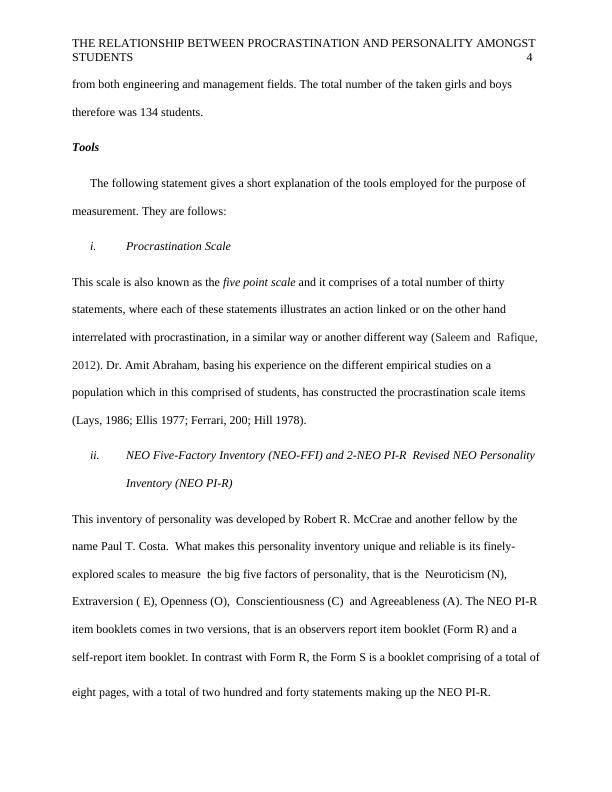The Relationship between Procrastination and Personality amongst Students Case Study 2022
Added on 2022-10-19
18 Pages2864 Words18 Views
THE RELATIONSHIP BETWEEN PROCRASTINATION AND PERSONALITY AMONGST
STUDENTS 1
The Relationship between Procrastination and Personality amongst Students
Student’s Name
Institutional affiliation
Date of submission
STUDENTS 1
The Relationship between Procrastination and Personality amongst Students
Student’s Name
Institutional affiliation
Date of submission

THE RELATIONSHIP BETWEEN PROCRASTINATION AND PERSONALITY AMONGST
STUDENTS 2
Abstract
An empirical study carried out by Vodanavish and Sieb in 2007 states that around a quarter
of adult population procrastinate. The reason as to why people procrastinate is a question that has
fueled many researchers to embark on a study to investigate it. It has been said for a while that
procrastination is sometimes as a result of some factors of personality .Generally, there are three
types of procrastinators that is the low procrastinators, average procrastinators and high
procrastinators. There are five personality traits namely; conscientiousness, Neuroticism,
Openness, Extraversion and Agreeableness. Therefore, this work aims at investigating whether
there is any relationship between personality and procrastination.
Introduction
The Agenda of this study was to find out if by any means there exist an association
between the big five personality traits ant the three categories of procrastinators, that is in both
females and males in the professional and the nonprofessional sector (Sæle, Dahl, Sørlie and
Friborg, 2017). Three objectives and hypothesis in relation with these variables were formulated
in order to achieve the target aim of this study. The hypothesis formulated were linked with the
study of how the personality factors , that is Openness to experience, Neuroticism,
Conscientiousness, Extraversion and Agreeableness in both professional and unprofessional
female and male developments are related to three categories of procrastinators (Athulya, Sudhir
and Philip, 2016). The big five factors of personality ( Openness, Extraversion, Agreeableness,
Neuroticism and conscientiousness) and the three categories of procrastination that is the low
average and high levels were the factors in which the objectives of this study are based, in the
STUDENTS 2
Abstract
An empirical study carried out by Vodanavish and Sieb in 2007 states that around a quarter
of adult population procrastinate. The reason as to why people procrastinate is a question that has
fueled many researchers to embark on a study to investigate it. It has been said for a while that
procrastination is sometimes as a result of some factors of personality .Generally, there are three
types of procrastinators that is the low procrastinators, average procrastinators and high
procrastinators. There are five personality traits namely; conscientiousness, Neuroticism,
Openness, Extraversion and Agreeableness. Therefore, this work aims at investigating whether
there is any relationship between personality and procrastination.
Introduction
The Agenda of this study was to find out if by any means there exist an association
between the big five personality traits ant the three categories of procrastinators, that is in both
females and males in the professional and the nonprofessional sector (Sæle, Dahl, Sørlie and
Friborg, 2017). Three objectives and hypothesis in relation with these variables were formulated
in order to achieve the target aim of this study. The hypothesis formulated were linked with the
study of how the personality factors , that is Openness to experience, Neuroticism,
Conscientiousness, Extraversion and Agreeableness in both professional and unprofessional
female and male developments are related to three categories of procrastinators (Athulya, Sudhir
and Philip, 2016). The big five factors of personality ( Openness, Extraversion, Agreeableness,
Neuroticism and conscientiousness) and the three categories of procrastination that is the low
average and high levels were the factors in which the objectives of this study are based, in the

THE RELATIONSHIP BETWEEN PROCRASTINATION AND PERSONALITY AMONGST
STUDENTS 3
group college learner, professionals and nonprofessionals, and females versus males. There was
a need to come up with particular objectives for our ultimate study, and therefore the following
objectives were selected.
Study objectives
i. To study why students in the two fields of courses procrastinate, that is the
professional and nonprofessional courses.
ii. To investigate if there is variance in as to why males and females tend procrastinate.
iii. To investigate if the big five personality factors in the midst of males and females
vary.
Hypothesis
H1: There going to be no close interconnection between Extraversion (E) personality aspects and
the three categories of procrastination that is the low level, the average level and the high level.
H2: The is going to be no close interconnection between Openness(O) personality aspects and
the three categories of procrastination, that is the low, average, and high levels.
H3: There is going to be no close relationship between Agreeableness (A) aspects in the three
categories of procrastination that is the low level, the average level and the high level.
Sample
Professional as well as nonprofessional options of study in the different degrees were the
two various categories in which our samples were selected from and therefore purposive random
sampling was done. The sample therefore comprised of girls and boys, whose age range between
18 to 28 years, randomly taken from various graduation and also the after graduation courses,
STUDENTS 3
group college learner, professionals and nonprofessionals, and females versus males. There was
a need to come up with particular objectives for our ultimate study, and therefore the following
objectives were selected.
Study objectives
i. To study why students in the two fields of courses procrastinate, that is the
professional and nonprofessional courses.
ii. To investigate if there is variance in as to why males and females tend procrastinate.
iii. To investigate if the big five personality factors in the midst of males and females
vary.
Hypothesis
H1: There going to be no close interconnection between Extraversion (E) personality aspects and
the three categories of procrastination that is the low level, the average level and the high level.
H2: The is going to be no close interconnection between Openness(O) personality aspects and
the three categories of procrastination, that is the low, average, and high levels.
H3: There is going to be no close relationship between Agreeableness (A) aspects in the three
categories of procrastination that is the low level, the average level and the high level.
Sample
Professional as well as nonprofessional options of study in the different degrees were the
two various categories in which our samples were selected from and therefore purposive random
sampling was done. The sample therefore comprised of girls and boys, whose age range between
18 to 28 years, randomly taken from various graduation and also the after graduation courses,

THE RELATIONSHIP BETWEEN PROCRASTINATION AND PERSONALITY AMONGST
STUDENTS 4
from both engineering and management fields. The total number of the taken girls and boys
therefore was 134 students.
Tools
The following statement gives a short explanation of the tools employed for the purpose of
measurement. They are follows:
i. Procrastination Scale
This scale is also known as the five point scale and it comprises of a total number of thirty
statements, where each of these statements illustrates an action linked or on the other hand
interrelated with procrastination, in a similar way or another different way (Saleem and Rafique,
2012). Dr. Amit Abraham, basing his experience on the different empirical studies on a
population which in this comprised of students, has constructed the procrastination scale items
(Lays, 1986; Ellis 1977; Ferrari, 200; Hill 1978).
ii. NEO Five-Factory Inventory (NEO-FFI) and 2-NEO PI-R Revised NEO Personality
Inventory (NEO PI-R)
This inventory of personality was developed by Robert R. McCrae and another fellow by the
name Paul T. Costa. What makes this personality inventory unique and reliable is its finely-
explored scales to measure the big five factors of personality, that is the Neuroticism (N),
Extraversion ( E), Openness (O), Conscientiousness (C) and Agreeableness (A). The NEO PI-R
item booklets comes in two versions, that is an observers report item booklet (Form R) and a
self-report item booklet. In contrast with Form R, the Form S is a booklet comprising of a total of
eight pages, with a total of two hundred and forty statements making up the NEO PI-R.
STUDENTS 4
from both engineering and management fields. The total number of the taken girls and boys
therefore was 134 students.
Tools
The following statement gives a short explanation of the tools employed for the purpose of
measurement. They are follows:
i. Procrastination Scale
This scale is also known as the five point scale and it comprises of a total number of thirty
statements, where each of these statements illustrates an action linked or on the other hand
interrelated with procrastination, in a similar way or another different way (Saleem and Rafique,
2012). Dr. Amit Abraham, basing his experience on the different empirical studies on a
population which in this comprised of students, has constructed the procrastination scale items
(Lays, 1986; Ellis 1977; Ferrari, 200; Hill 1978).
ii. NEO Five-Factory Inventory (NEO-FFI) and 2-NEO PI-R Revised NEO Personality
Inventory (NEO PI-R)
This inventory of personality was developed by Robert R. McCrae and another fellow by the
name Paul T. Costa. What makes this personality inventory unique and reliable is its finely-
explored scales to measure the big five factors of personality, that is the Neuroticism (N),
Extraversion ( E), Openness (O), Conscientiousness (C) and Agreeableness (A). The NEO PI-R
item booklets comes in two versions, that is an observers report item booklet (Form R) and a
self-report item booklet. In contrast with Form R, the Form S is a booklet comprising of a total of
eight pages, with a total of two hundred and forty statements making up the NEO PI-R.

End of preview
Want to access all the pages? Upload your documents or become a member.
Related Documents
Procrastination and Three of Big Five Personalitylg...
|14
|3080
|390
(PDF) Relationship Between Empathy and Personality Traitslg...
|13
|2759
|349
Organizational Behavior: Understanding Human Behavior in Organizationslg...
|4
|1675
|73
Impact of Conscientiousness in Students' Motivationlg...
|5
|1446
|59
Influence of Exposure to Facebook on Personality, Self-Esteem and Social Perception in Working Environmentlg...
|9
|4263
|226
A Case Study On Big Five Personality Theorylg...
|4
|994
|19
